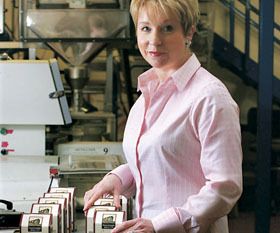Foodie fortunes / New Directions

[PAGEBREAK]Talent and taste Can a feel for food lead to a great new career? Sian Rees talks to four women with a talent for taste and a hunger for success
Additional reporting Lorraine Conway Photographs Neil Hickson, News Team, Angela Nott
[PAGEBREAK]Truly saucy “I cooked up a career in my kitchen”
Anila Vaghela, 50, lives in Walton-on-Thames, Surrey, with her husband Dhirajlal (Dan), 51, who has recently given up working in IT security to join Anila’s business. They have two daughters Viren, 25, and Vanisha, 23.
Old job: PA. New job: Anila started Anila’s Authentic Sauces (cook-in sauces for curries) from her kitchen. Start-up costs: £5,000. First year’s earnings: £11,000. Last year’s earnings: £130,000, and she has just started taking a small salary.
“For years, I would rush home after work to start cooking a curry from scratch for the family’s dinner. I found it increasingly exhausting, so I started making sauces that I could freeze in sterilised jam jars. A friend suggested selling them at a local market and they proved incredibly popular – people would track me down to ask for more. I was convinced that I had stumbled on a business opportunity, but I didn’t really think about starting my own company until I was made redundant from my job as a PA. However, when I went to a supermarket to evaluate the opposition, my heart sank. There were at least ten kinds of sauces on the shelf, so I thought I had missed the boat. Trying not to feel disappointed, I bought them all and over the following ten days used them to cook for my family. Only four of them passed the test and some were quite disgusting. This gave me the confidence to go forward and convinced me that I should use only premium ingredients and focus on a niche market. I used £5,000 of my redundancy money to buy an assortment of cooking equipment and I read up on how to bottle sauces. I found out that making a sauce which will be used as a base for a dish is very different to actually making that dish – you can’t just cram a curry dish into a jar. So Dan and I spent around four months concentrating on perfecting a formula. I then turned my attention to the business end of things. I was anxious to meet all the food safety standards, so I studied supermarket labels and followed guidance from information leaflets and Elmbridge’s local environmental officer. When the Trading Standards were happy, we were ready. I rang department stores and spoke to the grocery buyer, then followed up with a letter and samples. Within a week, Bentalls had placed an order. I worked steadily through a directory of delis and farm shops; I would choose an area, load up the car with boxes and drive to each shop. Ninety per cent of the time delis would buy a dozen jars and then re-order when they’d sold out. Fortnum & Mason started stocking my products and other orders began arriving fast, but I was still working from my kitchen as my biggest headache was finding a factory. I travelled all over the south-east to look at premises, but ideal sites would be taken off the market when the landlord heard I was going to make ‘smelly’ curry sauces. I resigned myself to working from home – even though it wasn’t perfect. The house was littered with boxes and my daughters would come home from work expecting to be fed only to find the kitchen taken over by the latest batch of sauces. However, it did mean that despite working 14-hour days, I still got to spend plenty of time with the family. In fact, we would all label jars while watching TV. Then, just as we’d had a kitchen extension built, a unit in Hounslow became available. I spent £11,000 on refurbishing it and three years later I have four staff working for me. My husband has always helped out, but he now plans to concentrate full-time on marketing my business. He can’t believe how much more I do than just make the sauces.” (020) 8577 6162; www.anilassauces.com
My worst mistake: Not investing in machinery and staff sooner, though it was probably healthier in the long run that the company was able to grow organically and steadily. My best move: Relocating from the family kitchen to a separate unit. You need to separate your work life from home life. Top tip: Borrow as little money as possible. I was able to plough early profits back into the business rather than using it to meet any loan payments.
Sign up for the woman&home newsletter
Sign up to our free daily email for the latest royal and entertainment news, interesting opinion, expert advice on styling and beauty trends, and no-nonsense guides to the health and wellness questions you want answered.
[PAGEBREAK]New spice “We bought a company and the food testers were my children” Fiona Mulroy, 42, runs a spice company with her husband Robert, 47. They live in Bewdley, Worcestershire, with their children, Rayne, six, and Tom, four.
Old job: Sales and promotion. New job: Runs the Shropshire Spice Company. Start-up costs: We took out a big loan on our home to buy the business. First year’s turnover: £600,000.
“When we first heard about the Shropshire Spice Company, Robert was running a computer business and I was freelancing. We were looking for something we could do together and, as I love cooking, it seemed the perfect business to build up as a couple. Robert takes care of the computers and financial side while I concentrate on the staffing, marketing and, what I enjoy most, product development. It’s a grand term when you consider how one coating came about. I had bought yet more chicken for the children and was frantically thinking of something different to do with it. I vaguely remembered Jamie Oliver doing something with breadcrumbs and with a factory full of the stuff I decided to try devising a new recipe. I slicked on a little olive oil, played around with some of our herbs and spices, and my kids loved it! We sell to major supermarkets, butchers’ shops, Harrods and Harvey Nichols and our new range of gourmet coatings is due in the shops shortly. Our factory is in Clun, which is an hour’s commute, but we’d never relocate because of the staff. I call them my Spice Girls and they’re so wonderful. Working with them is one of the aspects I love most about the job – that and creating new coatings.” Call 01588-640100 or visit www.shropshire-spice.co.uk.
My worst mistake: Not noticing the high salt content of a product until it was about to be launched was a major error. My best move: Investing in a second production line. It isn’t always used, but at least we can now respond instantly to urgent larger orders. Top tip: Don’t depend on one source of custom – always spread your risk.
[PAGEBREAK]High seas “I’m sharing my passion for seafood”
Fiona Asson, 49, lives in Moreton, Shropshire with her husband Tony and their children, Henry, 11, and Lucy, eight.
Old job: Professional development officer for the Royal College of Nursing. New job: Runs a fresh fish delivery business. Start-up costs: £17,000. First year’s turnover: £80,000.
“One day, over a bottle of wine, my friend John (a wholesale fishmonger) and I began talking seriously about a way of sharing our passion for seafood with other people. Research showed that people want fresh fish from an ethical source and a bigger selection than the supermarkets offer. We knew a shop wasn’t the way to go because we couldn’t compete with supermarket prices – so inspired by organic fruit and vegetable boxes, we came up with ‘Fish in a Box’. We decided that John would hand-pick the best fish from a market in Birmingham where lorries deliver from different ports and we’d use a unit next to his house to prepare and pack. I’d concentrate on marketing the business from my home office, which meant I could still spend time with the kids. We pooled our savings and bought a refrigerated van, kitted out John’s unit and printed fliers. We started with just 15 orders from friends and family and as demand grew through advertising and exhibiting at trade fairs, we took on two packers and five drivers. Today we have 400 orders a week and stock 40 different types of fish, including many sustainable varieties. The hours are long and tiring and I haven’t yet matched my old salary, as we’ve ploughed most of the profits back into the business, but I’m delighted with my new life.” Call 01952-691453 or visit www.fishinabox.co.uk.
My worst mistake: We accidentally sent a box of fish bones to a customer. Fortunately, they saw the funny side. My best move: Joining Heart of England Fine Foods (01746- 785185; www.heff.co.uk), which offers great advice and marketing opportunities for small food businesses. Top tip: Always look out for funding for your business. We applied for a grant through Advantage West Midlands – a Government-run regional development agency – for help to set up our website and received half the costs.
[PAGEBREAK]Food inspiration “I’m a real foodie and love inspiring people to cook”
Philippa James, 45, lives in Mawdesley, Lancashire. She’s married to Kevin, 51.
Old job: PR for husband’s sailing and diving business. New job: Running a cookery school and cake business. Start-up costs: About £3,000. First year’s earnings: £5,500. This year’s projected turnover: £40,000
“My life completely changed about four years ago when an infection in Kevin’s foot turned sinister and left him wheelchair-bound. I became his main carer and, because he couldn’t go out to work, the breadwinner. To lift his spirits and get him out of the house (and earn some extra cash too), I suggested we take a stall at a local car boot sale. When we had run out of things to sell, I baked a batch of cakes, which were hugely popular. Then another stall holder suggested selling them at a local farmers’ market. I baked Dundee cake, a luscious lemon cake from my auntie’s recipe and made chutneys and jams. The cakes sold well, so in between working part-time as an auxiliary nurse and prison tutor to pay the bills, I baked. In the run up to one Christmas, I was making banana and date chutney, but was so exhausted that I nodded off at the kitchen table. When I eventually woke up the chutney looked revolting – all dark and sludgy. However, it tasted pretty good, so I named it Reindeer Poo Chutney and sold it to children looking for gifts for their grandparents. Amazingly, it won silver at last year’s Great Taste Awards, the food industry equivalent to the Oscars. I soon became a regular face at the market and because of my passion for local produce, representatives from Made in Lancashire, the producers support group, asked me to do a food demo at an agricultural college’s open day. It went well and invitations for more demos arrived. The experience made me realise that people want more informal cookery courses, then I was inspired to start my own school. This proved to be the turning point in my culinary career. I rented a unit and filled it with all my kitchen appliances and I’ve taught everyone from children to widowers and hen parties. I love inspiring people to cook. When I was working as an auxiliary nurse, I never imagined that I’d be doing this now. Call 01257-450011 or visit www.philippas.co.uk.
-
 Sienna Miller's best hair and makeup moments from across the years
Sienna Miller's best hair and makeup moments from across the yearsWe revisit some of her top beauty looks from the archives...
By Lucy Abbersteen Published
-
 Katie Holmes broke an unspoken fashion rule in tights and mules - her shoes are available for less than £100 on Amazon
Katie Holmes broke an unspoken fashion rule in tights and mules - her shoes are available for less than £100 on AmazonThe statement gold kitten heels are a surprisingly versatile spring staple
By Charlie Elizabeth Culverhouse Published